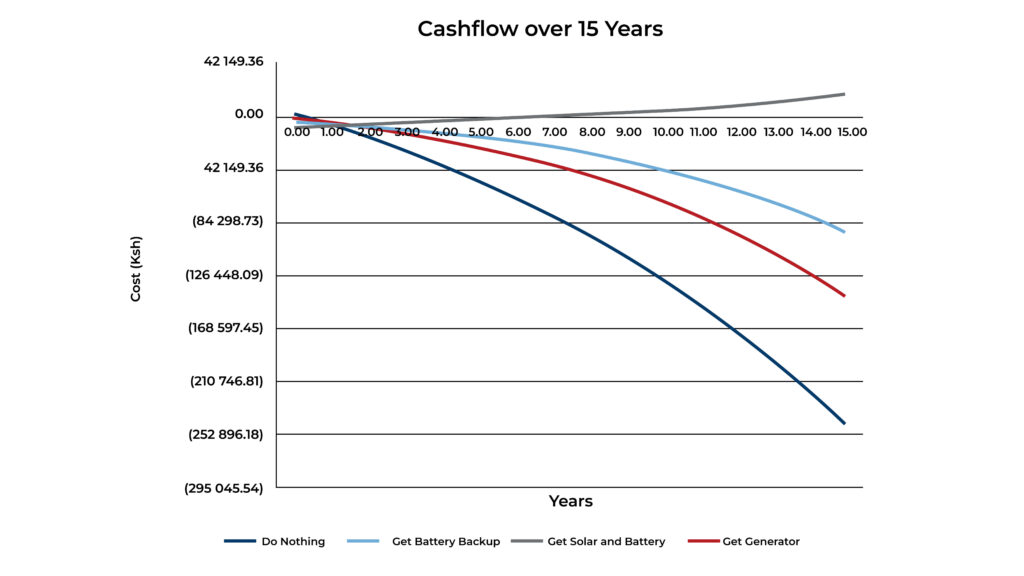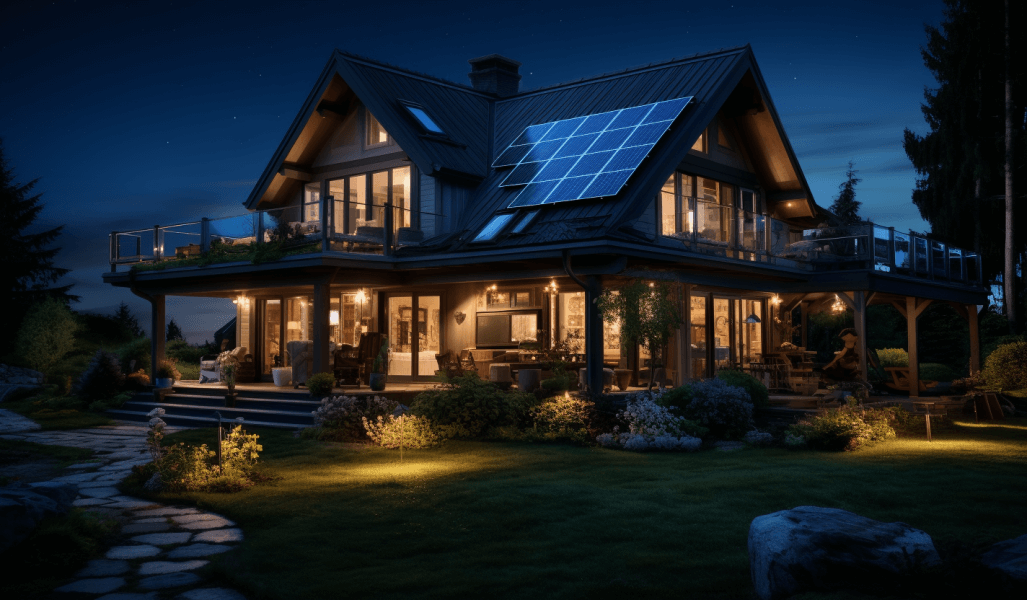Unreliable power supply and frequent power cuts have been longstanding issues in many parts of Kenya.
This situation has significant impacts on the daily lives of people, as it affects various aspects such as lighting, cooking, communication, and access to essential services.
Additionally, businesses and industries often face challenges in maintaining consistent operations due to these power interruptions.
Efforts have been made to address this issue, including initiatives to improve the country’s power infrastructure and promote alternative energy sources like solar power.
READ ALSO: First Hydrogen Power Plant in Kenya
However, progress in this area can sometimes be slow and uneven, leaving many households and businesses still vulnerable to the effects of unreliable electricity supply.
READ ALSO: 1.6 Million Low-Income Citizens In Kenya Gain Access to Electricity With ADF’s Support
Sometimes these outages can be a major inconvenience, and for some, a matter of life and death. Having a reliable backup power source is essential in such situations, and these two primary options have emerged as popular choices:
- Backup batteries
- Fuel powered generators
But which one is the better choice for your needs?
In this comprehensive guide, we explore the key differences between these two emergency power solutions and help you make an informed decision.
Table of Contents
Battery Backups: A Sustainable Alternative
Battery backup systems like the Dayliff Power Backup System, Tesla Powerwall and LGES 10H and 16H Prime, store energy that can power your home during outages.
These batteries can be charged either from your home solar system or the electrical grid, making them a more environmentally friendly option compared to fuel-powered generators.
Additionally, they can be financially beneficial, especially if you’re on a time-of-use utility plan. By using energy from your battery during peak hours, you can save on electricity costs. If you have solar panels, excess energy generated can be stored for use during nighttime or periods of reduced panel efficiency.
Generators: Fuel-Powered Reliability
Standby generators, on the other hand, are connected to your home’s electrical panel and automatically activate during power outages.
These generators typically run on natural gas, liquid propane, or diesel, ensuring an uninterrupted electricity supply. Some models even offer the flexibility of dual fuel options. While they require fuel to run, certain natural gas and propane generators can connect to your home’s gas line or propane tank, eliminating the need for manual refills.
However, diesel generators need periodic refueling. Another great thing about standby generators is that they are much quieter than other types.
Comparing Costs
In terms of upfront costs, battery backups tend to be pricier, with an average-sized home system ranging from Ksh 40,000 to Ksh 500,000 including installation.

Generators have a slightly lower upfront cost, ranging from around Ksh 30,000 to Ksh 350,000 onwards depending on the type and range. However, generators come with ongoing fuel expenses, maintenance costs, and potential noise and emissions issues.
Installation and Maintenance
Battery backups have an edge when it comes to installation. They can be wall or floor-mounted, requiring less effort than generator installations. However, both systems require professional installation, which may cost hundreds of thousands and take a full day to complete. Generators, in addition to device installation, involve tasks like pouring concrete slabs, connecting to fuel sources, and installing transfer switches.
Keeping Your Home Powered
Generators shine when it comes to long-term power supply. With enough fuel, they can operate continuously for up to three weeks if necessary.
In contrast, battery backups have limited storage capacity. For example, the Tesla Powerwall offers 13.5 kilowatt-hours of storage, providing power for a few hours. Additional storage can be achieved with multiple batteries or integration with solar panels.
Enhancing Home Value with Backup Power Systems: A Boon for Homebuyers
In an era marked by growing uncertainty in power supply and the increasing prevalence of remote work, the value of homes equipped with backup power systems is on the rise.
As more individuals embrace the convenience and flexibility of remote work, the need for uninterrupted power to sustain home offices becomes paramount. Consequently, homebuyers are showing a keen interest in properties that come equipped with reliable backup power solutions.
The Home Office Revolution
The COVID-19 pandemic triggered a significant shift in the way people work, with remote work becoming the new norm for many. This shift has not only reshaped the traditional office landscape but has also led to a reevaluation of home environments. With the lines between work and home life blurring, the demand for dedicated home offices or flexible workspaces has surged.
However, remote work is only as effective as the technology that supports it, and that technology relies heavily on a steady power supply. Power outages can disrupt work, causing inconvenience and financial losses. Recognizing this, homebuyers are increasingly looking for properties that not only offer comfortable living spaces but also the assurance of uninterrupted productivity.
The Appeal of Backup Power Systems
Properties equipped with backup power systems have gained immense appeal in the real estate market. These systems, whether battery backups or generators, provide a safety net against power disruptions. They ensure that essential appliances and devices, including computers, routers, and lighting, continue to function seamlessly even when the grid fails.
The value of such features goes beyond mere convenience; it translates into peace of mind. Homebuyers are willing to pay a premium for properties that come equipped with backup power, viewing it as a long-term investment that safeguards their lifestyle and work commitments.
Enhancing Home Value
For sellers, having a backup power system in place can significantly enhance the value of their property. A home with a reliable backup power solution is not just a residence; it’s a sanctuary that offers security and continuity. This added value can set a property apart in a competitive real estate market and attract buyers looking for the complete package.
In the bustling real estate market of Kileleshwa, a 2-bedroom apartment is currently listed at 11.5 million Kenyan Shillings, while one without the added benefit of a backup power system is priced slightly lower at 10.5 million Kenyan Shillings. For sellers, the presence of a reliable backup power solution can be a game-changer. It transforms a house into a haven, offering both security and uninterrupted living. This added feature can give a property a distinct edge in a competitive market, attracting buyers in search of a comprehensive package.
Furthermore, homes with backup power systems may also be seen as more sustainable and eco-friendly, aligning with the growing environmental consciousness of modern homebuyers. Sustainable features, including solar panels integrated with battery backups, can further boost the appeal and value of a property.
Future-Proofing Your Home
In an unpredictable world where power outages, extreme weather events, and unforeseen disruptions can occur, having a backup power system is a form of future-proofing. It ensures that your home remains a sanctuary of stability, allowing you to carry on with work, stay connected, and maintain essential services even in challenging times.
As the real estate landscape continues to evolve, properties equipped with backup power systems are poised to become more than just desirable; they’re becoming essential. Whether you’re in the market to buy or sell a home, consider the added value and peace of mind that backup power can bring to your investment.
In conclusion, the value of a house with a backup power system extends far beyond its initial cost. It’s an investment in continuity, convenience, and the adaptability needed for the modern way of life, especially as remote work and home offices become increasingly prevalent. As you navigate the real estate market, keep in mind that a home with a reliable backup power solution not only enhances its market appeal but also ensures that you’re prepared for whatever the future may hold.



